2013 Toyota 4Runner Service, Tires & Repairs
Get Started
Complete Auto Care for Your 2013 Toyota 4Runner
-
TIRES FOR YOUR 2013 Toyota 4Runner View Tire Info GET TIRE PRICING
-
REPAIR FOR YOUR 2013 Toyota 4Runner View Repair Info SCHEDULE REPAIR
-
MAINTENANCE FOR YOUR 2013 Toyota 4Runner View Maintenance Info SCHEDULE MAINTENANCE
-
OFFERS FOR YOUR 2013 Toyota 4Runner Limited Time Tire Offers VIEW ALL COUPONS
2013 Toyota 4Runner Tires
Recommended Tires | Tire Information
2013 Toyota 4Runner Tires Sizes, Speed Ratings, and Inflation
Not sure about your 2013 Toyota 4Runner tire size? Use the following chart to find information on tire size, speed rating, and inflation.
| Trim Level | Speed Rating | Inflation in PSI F/R | Tire Size |
|---|---|---|---|
| 2013 Toyota 4Runner Limited | H | 32 PSI/32 PSI | P245/60R20 |
| 2013 Toyota 4Runner SR5 | S | 32 PSI/32 PSI | P265/70R17 |
| 2013 Toyota 4Runner Trail | S | 32 PSI/32 PSI | P265/70R17 |
|
2013 Toyota 4Runner Limited Speed Rating: H Inflation F/R: 32 PSI/32 PSI |
|
2013 Toyota 4Runner SR5 Speed Rating: S Inflation F/R: 32 PSI/32 PSI |
|
2013 Toyota 4Runner Trail Speed Rating: S Inflation F/R: 32 PSI/32 PSI |
* Note: these models have different tire sizes depending on vehicle options.
Recommended Tires for Your 2013 Toyota 4Runner
What tires are best for a 2013 Toyota 4Runner? Check out the following tire brands and types.
 ALENZA AS ULTRA
ALENZA AS ULTRA
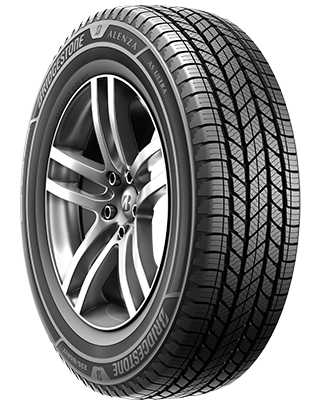
- No warranty
- All-Season
- Light Truck Tires
 Blizzak DM-V2
Blizzak DM-V2
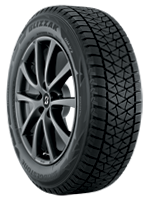
- No warranty
- Winter
- Winter
 Dueler H/T 684 II
Dueler H/T 684 II
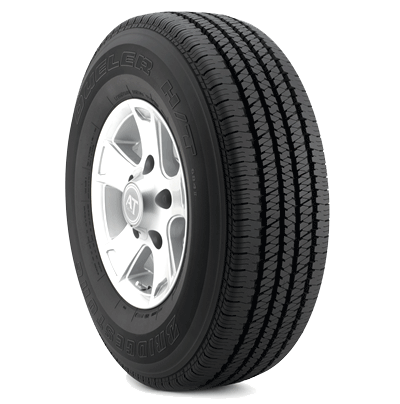
- Platinum Pact Limited Warranty
- All-Season
- Light Truck Tires
 Dueler A/T Revo 3
Dueler A/T Revo 3
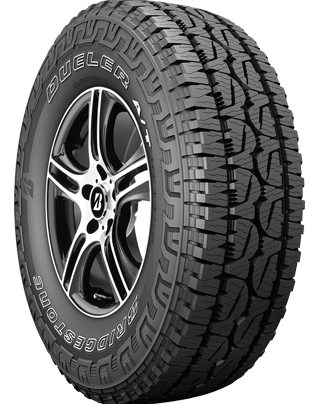
- Platinum Pact Limited Warranty
- All-Season
- Light Truck Tires
 Dueler A/T Revo 3 - LT
Dueler A/T Revo 3 - LT
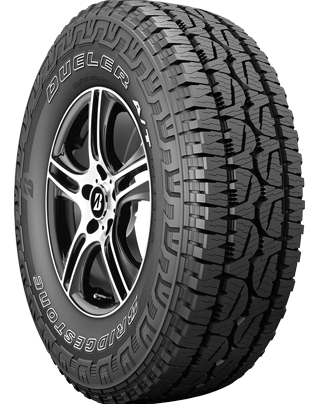
- Platinum Pact Limited Warranty
- All-Season
- Light Truck Tires
 Dueler A/T RH-S
Dueler A/T RH-S
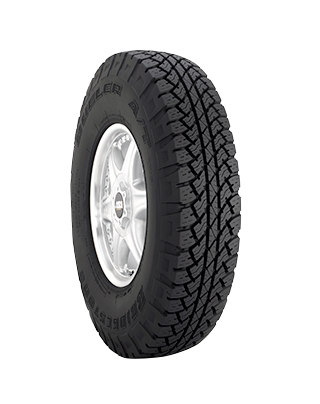
- Platinum Pact Limited Warranty
- All-Season
- Light Truck Tires
 Destination A/T2
Destination A/T2
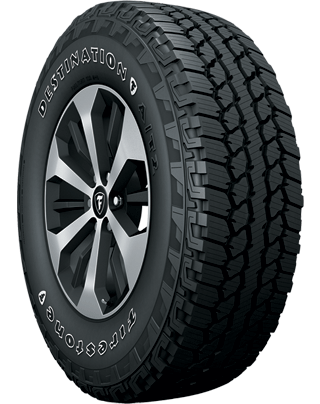
- Gold Pledge Limited Warranty
- All-Season
- Light Truck Tires
 Destination LE3
Destination LE3
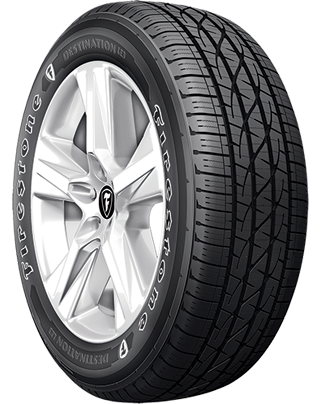
- No warranty
- All-Season
- Light Truck Tires
 Destination X/T
Destination X/T
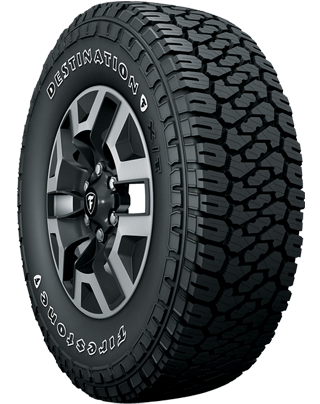
- Gold Pledge Limited Warranty
- All-Season
- Light Truck Tires
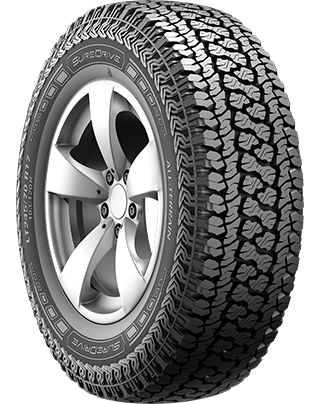
- No warranty
- All-Season
- Light Truck Tires
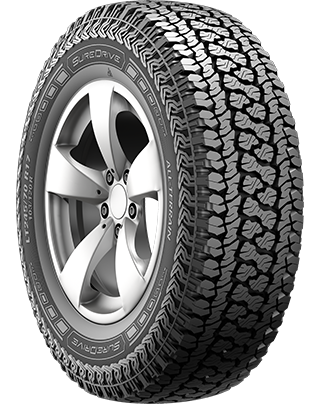
- No warranty
- All-Season
- Light Truck Tires
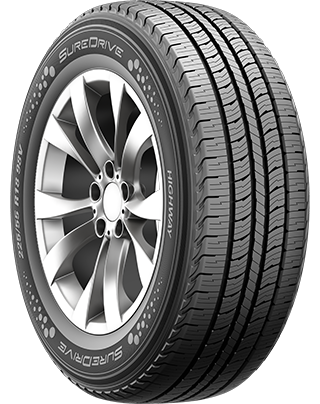
- No warranty
- All-Season
- Light Truck Tires
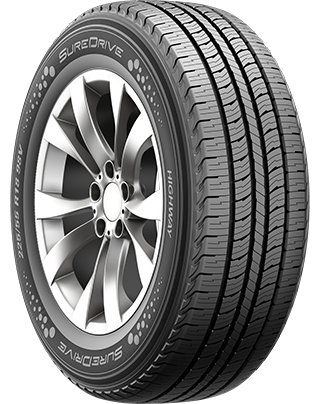
- No warranty
- All-Season
- Light Truck Tires
 OPEN COUNTRY A/T III
OPEN COUNTRY A/T III
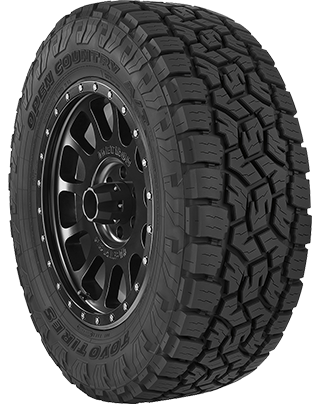
- No warranty
- All-Season
- Light Truck Tires
Choosing 2013 Toyota 4Runner Tires
Other than getting the proper tire size, you also want to consider a handful of other factors when buying new Toyota 4Runner tires like which tire brands you like most and where you drive. When thinking about your driving conditions, consider where you live (mountains vs. city vs. countryside) and the kind of weather can catch you off-guard. (Watch out Tornado Alley!) Many drivers who live in states that experience all four seasons choose to purchase two sets of tires: one for winter and one for summer. Other drivers buy one set of all-season tires instead. That way they don't have to return to the tire shop and their vehicle is always ready for sun, rain, and light snow!
Your personal driving style is the next factor to consider. If you're a big off-roading fan who forges paths where others can't, you have very different needs than a long-distance commuter who sticks to the highway. Visit your local Firestone Complete Auto Care for help selecting the tire that's right for you, or get started by browsing tires that fit your Toyota 4Runner.
2013 Toyota 4Runner Tire Installation & Rotation
Firestone Complete Auto Care has been a leading tire provider for more than a century. We're your one-stop shop for tire installation, rotation, and ongoing maintenance! We make it easy to buy new 2013 Toyota 4Runner tires online and book an installation appointment at the same time.
Questions About 2013 Toyota 4Runner Tires
-
Why does Toyota tire inflation matter? A small decrease in tire pressure can have a big impact on your driving. Maintaining proper tire pressure can help improve braking time, increase fuel economy, and boost tire lifespan.
-
Why are there numbers on the side of my Toyota 4Runner tires? The numbers on your tire sidewall give you information about tire speed rating, traction, treadwear, tire size, and load carrying capacity. Chat with a tire technician to learn how to read the numbers on your Toyota tires!
-
Is there an easy way to check Toyota tire tread depth? Stay on top of your tire tread depth to help avoid a dangerous drive. You can check tread depth with a penny. Hold the penny so that Abraham Lincoln is facing you, then place your penny into a tread groove upside down. If you can see the top of Abe’s head, your tread is shallow and it might be time for new Toyota 4Runner tires. Grab a penny. Hold the so that Abe Lincon's head is facing you and his hair is pointing toward the ground. Then, place the penny into a tread groove. If you can see the top of Abe’s head, your tread is shallow and it might be time for new Toyota 4Runner tires.
Repair Services for Your 2013 Toyota 4Runner
When to repair, when to replace? Click on a repair below to learn more about Toyota 4Runner repairs at Firestone Complete Auto Care.
About 2013 Toyota 4Runner Repairs
For most drivers, the words “car repair” don’t exactly spark excitement. But at Firestone Complete Auto Care, we strive to give you the excellent repair experience you deserve. Bring your 2013 Toyota 4Runner in for repair services and our technicians will take care of your 4Runner like it was their own. We'll work to evaluate the scope of repairs needed and explain your options. We value your trust, so we recommend only the repairs we think are necessary for your safety on the road.
How Much Does Toyota 4Runner Repair Cost?
Several factors can affect the cost to repair your 2013 Toyota 4Runner, including which repairs are needed, prices of appropriate replacement parts, the amount of labor necessary to get the job done, and where you live. We update them regularly to keep our deals fresh!
A few different aspects can influence repair costs for your 2013 Toyota 4Runner, like
2013 Toyota 4Runner Auto Repair Q&A
-
Do I still need scheduled maintenance even when nothing is wrong with my Toyota? Don’t neglect scheduled maintenance. Sure, you could skip out on a few recommended maintenance services, but you may pay the price later. Bring your vehicle to Firestone Complete Auto Care at recommended service intervals to address minor issues before they get out of hand and keep your car running newer, longer.
-
What does it mean to be 'in tune' with your car? No, we’re not talking about finding the best jams on the radio! You know your car best, and you’re the first person who will notice if something doesn’t feel right (like new smells, sights, or sounds coming from your car). If you sense that something is 'off,' stop in for a Courtesy Check to have these symptoms checked out ASAP. Early action could help you prevent Toyota 4Runner repairs.
-
Why do you recommend certain repairs for my Toyota? Trust is more than just a saying on the wall. It’s a window underneath it. That’s why we won’t recommend services or repairs for your 2013 Toyota 4Runner unless we think they’re vital to your safety on the road.
Brake Repair for Your 2013 Toyota 4Runner
You might have a strong and reliable engine in your Toyota 4Runner. But if you can't stop it, then it's scrap metal. If you notice your brakes are squeaking or not working well, don’t wait! Safe driving and responsive brakes go hand in hand. Plus, ignoring your brake problems can result in more damage and higher brake repair bills. Go to your local Firestone Complete Auto Care for 2013 Toyota 4Runner brake repairs. We offer a variety of brake services like brake pad/shoe replacement, brake rotor/drum refinishing, brake fluid exchange/bleeding, and brake caliper and wheel cylinder installation.
Answers to Your 4Runner Brakes Questions
-
Why does my 4Runner shake when I brake? Feeling shaking or vibrating in your 4Runner as you brake might indicate a few different problems, including worn brake pads or rotors, loose suspension components, damaged brake calipers, or warped rotors. Book an appointment for a free brake inspection as soon as you notice a problem with your brakes.
-
What is the average lifespan of 4Runner brake pads? You can usually get around 30,000 to 40,000 miles out of your brake pads, but how and where you drive your 4Runner can affect this. Hauling large loads or riding your brakes can shorten their lifespan, while smoothly braking and mostly sticking to highways can help your brake pads last longer.
-
Can brake fluid leak when my 4Runner is off? Because your 4Runner brake system is a closed hydraulic system, it should not leak brake fluid. However, if components in your brake system have worn out or been damaged, it might cause brake fluid to leak.
When to Get Toyota 4Runner Drivetrain Repairs
Drivetrains for front, rear, and all-wheel-drive and 4WD vehicles are not all the same. You don't want to go to any random shop for drivetrain repair. You want to come see the technicians at Firestone Complete Auto Care. We can fix many 2013 Toyota 4Runner drivetrain components Your 4Runner might need driveshaft repair if you notice clunks when shifting, vibration as your vehicle accelerates, resistance when turning, or heavy vibrations in your floorboards.
2013 Toyota 4Runner Drivetrain Q&A
-
How do I know if my Toyota drivetrain is damaged? Your Toyota 4Runner drivetrain might be damaged if you notice strange noises from the rear of your vehicle, see fluid leaking, or have issues turning.
-
Why is my 4Runner malfunction indicator light (MIL) on? If your 4Runner has its malfunction warning light (more commonly called the check engine light) illuminated, it could indicate engine troubles, problems with the transmission, electrical issues, malfunctioning sensors, connector problems, or misfire issues.
-
Is a drivetrain malfunction in my 4Runner serious? If your 4Runner has a drivetrain malfunction, don't wait. Get it checked out by a professional mechanic. Identifying the underlying cause and performing the appropriate repairs right away can help prevent further damage and avoid unsafe driving conditions.
2013 Toyota 4Runner Wheel Alignment
Alignment services involve precise adjustments to your Toyota 4Runner’s suspension system, the connection between the vehicle and the wheels. When your car has an alignment service, your tire angles are adjusted according to measurements recommended by Toyota. Why? So that your tires can make contact with the road at the best possible angle. When you bring in your 2013 Toyota 4Runner, we’ll perform an alignment check first. Then, we’ll adjust the angles as needed until they match recommended measurements from Toyota.
Questions About Toyota 4Runner Alignment
-
How can I avoid knocking my Toyota 4Runner out of alignment? When it’s safe to do so, avoid driving over potholes or hitting curbs. These road obstacles can wreak havoc on your wheel alignment, as can wear and tear from rough road conditions.
-
How often does your 4Runner need a wheel alignment? Generally, it’s wise to have your alignment looked at around every 6,000 miles or 6 months, whichever happens first. You should check your 4Runner owner’s manual to verify Toyota’s suggested interval.
-
Does getting new 4Runner tires mean you need an alignment? It’s not mandatory to get an alignment after installing new tires on your 4Runner, but it can be a smart decision! Proper alignment from the jump can help improve handling, fuel efficiency, and tire wear.
Engine Repairs for Your 2013 Toyota 4Runner
When your Toyota 4Runner engine needs repairs, our technicians will make sure you understand what’s going on before they start working on your engine. We make recommendations, but you make the final decision. If a repair can wait, we'll let you know. But if immediate repairs are necessary for your safety, we’ll make sure that's clear, too. We want to give you all the details you need to make an informed decision about your engine repairs. Choose Firestone Complete Auto Care for Toyota 4Runner engine repairs and you can feel good knowing that we only use Toyota-compliant replacement parts such as the cambelt, valve guide seal, fuses, or other parts.
Engine Q&A 2013 Toyota 4Runner
-
Why does the check engine light come on when I start my 4Runner? It's okay if your check engine light comes on when you first start your vehicle. This is a sign that your vehicle is testing its circuits. The light should go off shortly. Bring your vehicle in if it doesn't.
-
Why is my Toyota 4Runner making engine noise? Strange under-the-hood noises can point to problems within your Toyota 4Runner engine. Tapping or knocking could mean you need an oil change. Whistling sounds could mean you have an intake leak or misaligned belt. Squealing may be caused by a loose fan belt, and grinding could be a sign that something is wrong with your brakes — not the engine.
-
What could damage my Toyota 4Runner engine? Certain driving habits can hurt your engine. These habits include driving on an empty fuel tank, revving your engine while the vehicle is in Park, or slamming the gas pedal while the engine is still cold. Steer clear of these habits to help protect engine performance and efficiency.
2013 Toyota 4Runner Tire Repair
If your 2013 Toyota 4Runner is in need of a tire inspection or possible flat tire repair, Firestone Complete Auto Care has your back. There’s a chance your tire could be plugged and patched (rather than replaced). Our technicians can inspect your tire and let you know if it is safe to repair. We'll start by evaluating the state of wear, the location of damage, type of damage, and the size of the damage.
If we determine that your 2013 Toyota 4Runner tire can be safely repaired, the repair process is actually fairly simple: (1) Remove the tire from the wheel for inspection and repair, (2) fill the puncture to keep the moisture out, and (3) secure and seal the inner tire liner to ensure the tire is airtight.
Frequently Asked Toyota 4Runner Tire Repair Questions
-
How soon should I have my flat tire repaired? Driving on a flat or underinflated tire can put extra stress on your wheels and alignment. While it’s sometimes necessary to drive a short distance on a flat tire to get to a safe place, don’t take any other trips in your 4Runner until you can have the flat tire repaired or replaced.
-
Will a temporary sealant fix my Toyota's flat tire? A temporary sealant may be able to help you get to a repair location safely. But temporary or emergency sealants could possibly damage TPMS sensors, and in some cases may even void the warranty on your Bridgestone or Firestone tires. If your tire needs extensive repair, sealant can add time and labor costs to the process.
-
Why do my 4Runner tires keep losing air? Your 4Runner tires might keep losing air due to a leaking valve stem, puncture or hole in the tire tread or sidewall, or damaged wheel.
Maintenance for Your 2013 Toyota 4Runner
You want your Toyota 4Runner to last as long as possible. If you put in the effort to keep up with proper maintenance, you could hit 200,000 miles (or beyond!) in your 4Runner.
2013 Toyota 4Runner Maintenance Schedule
What is the manufacturer recommended maintenance schedule for a 2013 Toyota 4Runner? Find maintenance info for your vehicle.
About 2013 Toyota 4Runner Scheduled Maintenance
It can be overwhelming, but fortunately, there’s a resource that takes the guesswork out of routine 4Runner maintenance. Just follow your 2013 Toyota 4Runner maintenance schedule! The recommended maintenance schedule is put together by Toyota, your vehicle manufacturer. Scheduled maintenance services can vary depending on driving conditions, climate, and other factors; however, there’s a good chance that your vehicle’s recommended maintenance services will include tire rotations, vital fluid checks/exchanges, filter changes, brake pad replacement, and oil changes. Scheduling routine service appointments is one of the best ways to help extend your 4Runner's life, decrease your risk of dangerous malfunctions on the road, and maybe even save you the headache of dealing with common 2013 Toyota 4Runner problems in the future.
Learn About Vital Maintenance Needs for Your Toyota 4Runner
Come to Firestone Complete Auto Care for manufacturer-recommended routine maintenance on your 2013 Toyota 4Runner and an expert technician will begin by performing a Courtesy Check. A Courtesy Check helps "set the stage" for your service and catch any small problems before they turn into big repairs. Each Courtesy Check includes a free battery test and an inspection of your 4Runner's windshield wiper blades, head and tail lights, filters, fluid levels, tires, and alignment.
Firestone Complete Auto Care is the place to go for 2013 Toyota 4Runner maintenance. Don’t wait until something goes wrong with your car. Visit your nearest location for proactive maintenance today.
2013 Toyota 4Runner Maintenance Q&A
-
What do I do if I hit a pothole in my Toyota 4Runner? Watch out for pothole damage. If your 2013 4Runner is pulling to one side or the other, your tires or suspension system could be calling out for help.
-
When should I use high mileage oil in my Toyota 4Runner? Got 75,000+ miles on the odometer? Consider high mileage motor oil. High mileage oil is formulated to address the specific problems encountered by high mileage vehicles, or those with more than 75,000 miles. It can help reduce oil consumption, smoke, and emissions from older Toyota 4Runner engines.
-
Can I ignore dashboard lights on my Toyota? Because there might be a problem under the hood. Those warning lights are there for a reason! As soon as you notice that one’s illuminated, take your Toyota 4Runner to Firestone Complete Auto Care so you can address any small problems long before they worsen.
The Right Battery Size for a 2013 Toyota 4Runner
Need more info about Toyota 4Runner batteries?
| Battery | Engine | Warranty | Cold Cranking Amps | |
|---|---|---|---|---|
| 27F-3 | V6/4.0L | Replacement 24 months | Performance months | 710 |
| 35-2 | V6/4.0L | Replacement 36 months | Performance months | 640 |
| 24F-RP | V6/4.0L | Replacement 48 months | Performance months | 750 |
Car Batteries for 2013 Toyota 4Runner
Generally, car batteries last from three to five years. You want to replace your 2013 Toyota 4Runner battery before it fails and leaves you stranded. Look out for symptoms of a faulty car battery. A slow engine crank, an illuminated battery or check engine light, bloated battery case, corrosion-covered posts, or faded headlights can all be signs that your battery is waving goodbye.
Plus, at Firestone Complete Auto Care, we’ll test your battery for free. Drop in for a free battery check and, if needed, get your Toyota 4Runner a replacement battery. Automotive batteries are just one of our many areas of expertise. Our expert technicians understand Toyota service recommendations for 4Runner car batteries’ reserve capacities and cold cranking amps. Get help choosing the battery size that fits your car perfectly, and schedule a weekday or weekend battery replacement service for your car.
Answers to Your Toyota 4Runner Car Battery Questions
-
Why won't my Toyota 4Runner battery stay charged? A battery is in its final hour when it will no longer hold a charge. The battery may be too old. Or, you may have been leaving your car doors ajar and the cabin light at night. Stop by for a complimentary battery check at your favorite Firestone Complete Auto Care and get a handle on your car battery’s health.
-
What is the average lifespan of a car battery? Car battery lifespan varies depending on a few factors, including driving conditions, accessories, how well it’s maintained, and the type of battery. On average, a car battery lasts about three to five years.
-
What is the white, crusty substance accumulating on my 4Runner’s battery post? A chemical reaction between battery acid and the air can cause a white, crusty buildup to form on the terminals of your 4Runner car battery. This buildup — known as corrosion — can impede the flow of electricity and cause a range of issues, from poor performance to premature battery failure.
2013 Toyota 4Runner Oil Change Service
Your 2013 4Runner’s oil should be changed according to Toyota’s recommended oil change intervals. No matter the mileage, your 4Runner may need its oil changed ASAP if your check engine light is on, you hear knocking sounds coming from the engine, sense an oil smell in the cabin, or see an excess amount of vehicle exhaust. You might need an oil change more frequently than what’s recommended by Toyota if you regularly haul heavy loads, frequent dusty roads, go off-roading a lot, or go at low speeds on long distance trips.
Your local Firestone Complete Auto Care has the right 2013 Toyota 4Runner motor oil: either synthetic or conventional. Consult Toyota's recommendations to select the right 2013 4Runner oil and talk with a teammate to learn more about our oil options: Quaker State® Advanced Durability™ conventional oil, Pennzoil® High Mileage Vehicle® motor oil, Pennzoil Platinum® Full Synthetic motor oil with PurePlus™ Technology, and Shell Rotella® heavy-duty engine oil. During an oil change, one of our techs will change your 4Runner’s oil, replace and recycle your used oil and oil filter, check all of your other filters, top-off essential fluids, and perform a free inspection on the rest of your vehicle. Let the experts take care of your 4Runner’s engine by making an oil change appointment today.
Oil Change Q&A for Your 2013 Toyota 4Runner
-
What does it mean if my Toyota 4Runner oil light comes on? Your Toyota 4Runner oil change reminder light might illuminate if it’s been too long since your last oil change. On the other hand, the oil pressure light might illuminate due to a clogged oil filter, a faulty oil pressure sensor, low engine oil levels, or a malfunctioning oil pump.
-
How hard is it to change Toyota 4Runner oil at home? Changing engine oil at home isn’t as simple as it’s made out to be. You’ll have to figure out how to properly dispose of the oil and buy special tools. Having your oil changed professionally can not only reduce the risk of something going wrong during the service, but it’ll also help your car perform smoothly down the road.
-
Why is my Toyota 4Runner exhaust smoke grayish or blue? There could be an oil leak and your engine is burning oil. Time to have a qualified technician check things out. The leak could be caused by several issues like leaking valve seals, damaged piston rings, or worn cylinder walls.
2013 Toyota 4Runner Engine Tune-Ups & Maintenance
Periodic tune-ups can bring more power back to your 4Runner’s engine. The Firestone Complete Auto Care location in your community offers several Toyota 4Runner engine tune-up services. One option is the standard Firestone Tune-Up. This includes the installation of new spark plugs and a visual inspection of your engine’s components, plus a lifetime warranty on parts*. A second service option replaces the air and fuel filter in your 4Runner. Yet another service is a fuel system cleaning process, which involves removing varnish, dirt, and carbon deposits that have built up inside the fuel injectors, throttle body, and throttle plate in your 4Runner. This goes a long way in boosting your fuel system’s overall performance. Consider this when choosing a tune-up service for your 4Runner: your vehicle’s maintenance record and mileage can determine which service is best. Ask one of our technicians what your vehicle needs, based on your driving habits and your car’s current condition.
*Talk to a Firestone Complete Auto Care teammate for full terms and conditions on warranties.
2013 Toyota 4Runner Engine Tune-Up Q&A
-
Will it hurt my Toyota 4Runner to drive with old spark plugs? Replace spark plugs on time or about every 30,000 miles or so. Spark plugs are small but mighty. The spark of electricity that the plug emits across a small gap creates the ignition for the combustion needed to start your car. Without that spark, your car won't start.
-
What does a puddle underneath my Toyota 4Runner mean? Don't ignore puddles of fluid under your Toyota 4Runner. It could signal a coolant leak, brake fluid leak, or an oil leak. Let any one of these leaks linger and it could cause engine damage.
-
How often do Toyota 4Runner fuel injectors need to be cleaned? The frequency at which car fuel injectors should be cleaned can vary depending on several factors, including the type of fuel used and the driving conditions. Some manufacturers generally recommend a fuel system cleaning as part of your general car maintenance, or as needed based on symptoms of poor fuel system performance.
Suspension Service & Repair for 2013 Toyota 4Runner
During the first few years you had your 2013 Toyota 4Runner, you and your passengers probably enjoyed a ride that was smooth and balanced. Now, however, things are starting to feel a little rough. Maybe your 4Runner jolts, pulls to one side, or makes a weird sound when you drive over a speed bump or turn. The first sign of trouble is the best time to bring your 2013 Toyota 4Runner in for suspension and steering service. We’ll get to the root of the issue and, if steering and suspension service is needed, we’ll explain what your car needs and how much it’ll cost to get it done. We won't begin any work without your permission.
Questions About 2013 Toyota 4Runner Steering & Suspension
-
Why is my Toyota 4Runner bouncing so much? If your shocks or struts are in bad shape, they can’t dampen road bumps like they should. This can cause your 4Runner to bounce more than usual.
-
Why does my 4Runner tilt forward when I hit the brakes? The forward momentum and weight transfer to the front wheels during braking can cause your 4Runner's front end to dip forward. A damaged or faulty suspension system may fail to distribute the weight and force effectively, causing the front end to dip even more.
-
Does treadwear and tire pressure impact my 4Runner's steering and suspension? Maintaining your tires can help reduce strain on the suspension, nd also let you know when it's time to replace your tires. A faltering steering and suspension system could lead to uneven tire wear.
Convenient & Local 2013 Toyota 4Runner A/C Service
Technicians at Firestone Complete Auto Care are ready to help you address your 2013 Toyota 4Runner A/C problems. During an A/C performance check, we'll determine the condition of your 2013 Toyota 4Runner A/C system to evaluate what repairs are necessary (if any). This check will include an examination of system pressure, a visual inspection, and a leak test.
Let's say we repair your 2013 Toyota 4Runner A/C system. We will also perform an A/C evacuation and recharge. To do this, one of our technicians will remove the refrigerant in your A/C system (if there is even any left to remove). Then, they’ll perform an evacuation (also known as a discharge) on the entire system per Toyota guidelines. To finish, we’ll add new refrigerant to recharge the A/C system.
2013 Toyota 4Runner A/C System FAQs
-
What’s making my 4Runner A/C put out warm air? An A/C blowing hot air has several possible root causes. There could be an issue with your compressor clutch, a blown fuse, a leak, or a clog in the expansion valve.
-
How does my A/C system get a leak? A/C system leaks are often due to a combination of age and moisture. Rubber seals and gaskets naturally degrade over time, allowing refrigerant to exit and moisture to enter your 4Runner's A/C system.
-
Why won’t my 4Runner’s A/C cool the vehicle when the car is stopped? There could be issues with one or more components in the air conditioning or electrical system. Your 4Runner may have a faulty cooling fan or low refrigerant.
2013 Toyota 4Runner Transmission Service & Repairs
Your transmission carries power from the engine to the wheels so that you can drive at the speed you desire. Since the transmission has to translate the precise amount of power for your desired amount of speed, a tiny transmission issue can take a major toll on your car’s performance. 2013 Toyota 4Runner transmission issues could include shifting delays, grinding when accelerating, the car shaking at any speed, or whistling noises and a burning smell coming from under the hood. Let Toyota 4Runner transmission problems linger and you could see your fuel economy decrease or find that you can't drive your 4Runner at all. Our technicians know how to service your 2013 4Runner up to Toyota-recommended standards. Schedule an appointment at your local Firestone Complete Auto Care at the first sign of transmission problems to help keep your Toyota running for miles and miles.
2013 Toyota 4Runner Transmission Questions & Answers
-
Does my 4Runner's transmission fluid need to be inspected? Regularly checking and exchanging your 2013 4Runner’s transmission fluid is one of the best ways to help the transmission system perform. Some technicians would say that between 30,000 and 60,000 miles is a good timeframe for having your Toyota's transmission fluid checked and replaced, but that timeline can vary depending on how your vehicle is used and your manufacturer’s recommendations. The good news is that transmission fluid leaks are affordable to repair and easy to spot.
-
Can my Toyota 4Runner leak transmission fluid? Over time, transmission fluid can leak from your Toyota 4Runner, potentially causing transmission problems. A transmission fluid leak may be caused by a damaged transmission pan, faulty transmission cooler lines, worn-out seals, a cracked transmission housing, or an overfilled transmission.
-
Can I still drive my Toyota 4Runner if it has a transmission fluid leak? You should avoid driving with a transmission fluid leak. Your transmission system relies on transmission fluid to operate properly, and a leak may decrease performance, cause your 4Runner to overheat, or even lead to transmission failure.
Vehicle Inspection for 2013 Toyota 4Runner
When you bring your vehicle to Firestone Complete Auto Care for any service, we’ll automatically do a multi-point Courtesy Check. The technician will begin by testing your Toyota 4Runner's battery to see how much charge it has left – and determine if it may fail in the near future. The check will continue with a visual inspection of your Toyota 4Runner's lights, windshield wipers, filters, alignment, tires, hoses, belts and fluid levels.
While every visit to your local Firestone Complete Auto Care includes a Courtesy Check, you can also request a Complete Vehicle Inspection for your 2013 Toyota 4Runner if you suspect there may be a bigger problem. During a Complete Vehicle Inspection, we’ll visually check everything that’s on the list for a Courtesy Check. Additionally, we’ll perform an examination (by hand!) of your exhaust system, steering and suspension, and brakes. This inspection is aimed at informing you of any major problems that could need immediate attention in order to prevent further damage.
In some cities or states, you may be able to complete your vehicle’s safety tests or state inspection at your nearest Firestone Complete Auto Care. Specific requirements for these types of inspections vary by state.
FAQs for 2013 Toyota 4Runner Vehicle Inspections
-
How do I know if I should have an inspection on my Toyota 4Runner? It needs a check-up if something feels 'off' to you, the driver. Your Toyota 4Runner could benefit from a Courtesy Check if it has any illuminated dashboard lights, you hear weird noises coming from any part, the engine doesn't start sometimes, or your vehicle pulls to one side.
-
Help! My 2013 Toyota 4Runner failed the state inspection test. Can you get it to pass? Don’t panic! Come in for a complete inspection today and we’ll find (and repair) the root cause before you have your vehicle retested.
-
What's the ideal timing for a full vehicle inspection on my Toyota 4Runner? You should bring your Toyota 4Runner in for a full vehicle inspection if something weird happens and you can’t find the problem. A new dashboard light might come on, you may hear strange sounds under the hood, or your steering might feel off. A complete inspection is also a great idea before a road trip for added peace of mind.
2013 Toyota 4Runner Radiator Service
Keeping up with regular radiator maintenance in your 2013 Toyota 4Runner is a huge factor in the longevity of your engine. Toyota recommends that you replace coolant (also called antifreeze) at certain intervals, but you can also take note of any signs your radiator is going bad. You might be driving around (or about to be stranded) with a failing radiator if you see coolant leaks under your car, high engine temperatures, or a dashboard light that indicates low coolant.
At Firestone Complete Auto Care, we start by performing a thorough inspection of your Toyota 4Runner cooling system. We then do a machine-powered radiator exchange, replenish flushed chemicals, sealants, and lubricants, and then pressure check for leaks. From the radiator cap to the heater core, we’ll take excellent care of your 2013 Toyota 4Runner at Firestone Complete Auto Care.
Questions About Toyota 4Runner Radiators
-
What does the coolant light on my Toyota dashboard mean? Pay attention to the temperature gauge and lights on your dashboard. If a low coolant warning light comes on or your dashboard temperature gauge keeps rising, it’s likely that your engine is about to overheat (and could leave you stranded on the road). Wait for the engine to cool down, then have your coolant system checked immediately at your nearest Firestone Complete Auto Care.
-
What is causing my 4Runner to overheat? One of the main reasons your Toyota 4Runner engine might overheat is because you don’t have enough coolant. Other causes include a clogged radiator, a damaged cooling fan, a malfunctioning thermostat, or a faulty water pump.
-
My 4Runner radiator sounds like it's rumbling or boiling! What's up? Air pockets in your 4Runner’s cooling system may cause a rumbling or boiling noise. You could also have a clogged radiator or simply need to replace the radiator cap.